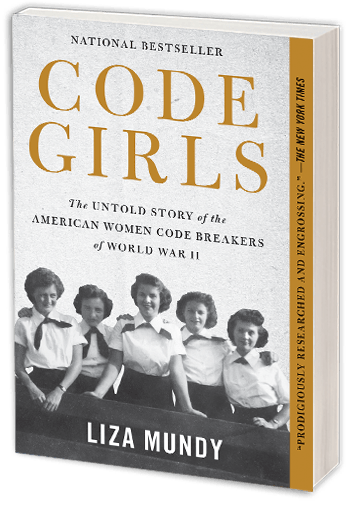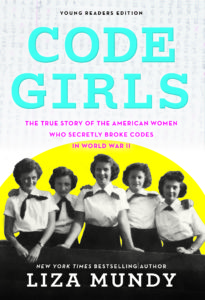
Now in Paperback & Young Readers Edition!
ORDER:
Hachette Book Group | iBooks
Amazon | B&N | Books-a-Million
IndieBound | Google Play
Click here for a signed copy
Hachette Books are available for premium and bulk purchase. Inquiries to special.markets@hbgusa.com
Recruited from settings as diverse as elite women’s colleges and small Southern towns, more than ten-thousand young American women served as codebreakers for the U.S. Army and Navy during World War II. While their brothers, boyfriends, and husbands took up arms, these women went to the nation’s capital with sharpened pencils–and even sharper minds–taking on highly demanding top secret work, involving complex math and linguistics. Running early IBM computers and poring over reams of encrypted enemy messages, they worked tirelessly in a pair of overheated makeshift code-breaking centers in Washington, DC, and Arlington, Virginia, from 1942 to 1945. Their achievements were immense: they cracked a crucial Japanese code, which gave the U.S. an acute advantage in the Battle of Midway and changed the course of the war in the Pacific Theater; they helped create the false communications that caught the Germans flat-footed in the lead-up to the Normandy invasion; and their careful tracking of Japanese ships and German U-boats saved countless American and British sailors’ lives.
Through extensive archival research and numerous interviews conducted with the surviving code girls (now in their nineties), Mundy has constructed a dazzling narrative that expertly conjures up the war years–the battles abroad and the uncertainty and excitement on the home front. Mundy hones in on the lives and labors of several exemplary code-breakers, including Ann Caracristi and Agnes Driscoll, while providing a broader portrait that celebrates the entire cohort of talented women, whose top secret has went without public recognition for nearly seventy years. She expertly weaves the story among the larger events of the war and the daily activities of the codebreakers, anchoring the story to the figure of Dot Braden, a schoolteacher recruited by the Army, who–before her arrival at Arlington Hall–had scarcely left Virginia (Dot is still living today at age 96 and open to doing limited publicity alongside Mundy). For many of these young women, breaking codes was one of the most thrilling times of their lives: they were engaged in stimulating, truly essential work–enjoying challenges and opportunities that had never been open to them before—while, in many cases, getting their first taste of big city life, falling in and out of love, amid the excitement and heartbreak of wartime.
Ordered by military officials never to reveal the scope of their war work, these women and their incredible stories and accomplishments were all but written out of history until Mundy discovered a cache of recently declassified documents at the archives of the NSA. Based on these documents, other rich archival sources, and interviews with the women themselves, CODE GIRLS offers a page-turning narrative of broad popular appeal while establishing a vital new historical record; and it brings to life this riveting story of American courage, service, and scientific accomplishment.


